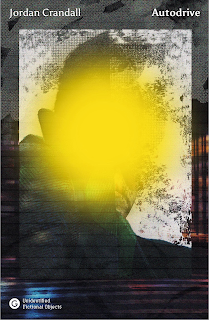Jordan Crandall is Professor of Visual Arts at University of California, San Diego. He is the author of five books, including Drive, an anthology of his artworks, media installations, and theoretical writings published by Neue Galerie Graz and ZKM Center for Art and Media Karlsruhe. In 2011 he was the recipient of the Vilém Flusser Theory Award for outstanding research in media art and digital culture. Autodrive is his first work of fiction.
About Autodrive, by Jordan Crandall
Autodrive is a work of literary fiction that melds techno-scientific inquiry and storytelling, critical theory and comedy, speculative fiction and satire. It is a road novel of sorts, an odyssey along the highways at a time when a new form of superintelligence has emerged. This new form of artificial intelligence is not entirely distinct from the characters in the narrative — it is ingrained in the machines they already use, the vehicles they already take, the systems they are already part of, but cannot fully see. The human character who is typically at the center of the fictional world gives way to an eccentric cast of performers — an ensemble of people and machines.
You can see more information about Autodrive on the publisher's website here. Below, you can read an excerpt from the novel.
From Autodrive
City Center West
There was an accident at the construction site on the north side of the Crosstown. One of the excavation machines knocked a truck off the overpass. It created a huge bottleneck along the frontage road. We had to inch along in bumper to bumper traffic for nearly an hour.
People were patient at first, but then a few of the passengers started complaining in a way that caused everyone else to start complaining. A strange phenomenon happens in situations like that, suddenly everyone unloads, it releases a feeling of anguish but also excitement.
Everyone was speaking loudly in order to be heard above the noise. But it was hard to hear anything, you could only pick up bits and pieces of what people were saying. There was talk of accidents, anomalies, irrepressible crowds. A hearse chasing a group of tourists. A delivery truck menacing a passenger van. A parking lot brawl that got out of hand.
A traveler in the adjoining seat started talking to me. I found it hard to engage with him because he was wearing one of those facepieces that hide your expression. The only part that moves is a mouthlike orifice, a slot over the mouth for eating. Sometimes it snaps open and shut and you expect a voice to come out, but the voice does not come from there, it comes from an embedded speaker that has no relation to the mouth.
There is a much greater chance of misunderstanding if your face is hidden, I told him. It is better to have a transparent shield, like an astronaut. A bubble is better.
He started telling me about a mysterious car that was trailing him. A Compiler-type model that did nothing but follow him around. It would pull up to the house and sit there. Park outside the office and wait. He said he could feel it out there waiting for him even if he could not see it—one of those things you just know, like when you can feel someone staring at you without having to turn around to look.
I asked him if he had any idea of who might be in the car.
He had the sense that there was no one operating the car. That it was self-determined in some other way.
What way, I asked him.
Like the cars in those old road movies, he said. The ones that had no drivers but were self-operated somehow—powered by an unknown force. Limousines and hearses, towncars and trucks that appeared out of nowhere and chased people. Plowed into traffic, mowed down pedestrians, bumped off policemen, slammed into cars. Messengers of catastrophe, he called them. Self-aware, self-willed, superintelligent machines ready to strike, turn on the people they were created to serve.
A superintelligent machine would not act that way, I told him. It would be more like a conglomerate, more like a corporation than a vehicle. If you want to worry about a malevolent AI, that is what you should be concerned about. Not a machine that is out to get you, but an organization that is.







.jpg)






